Share
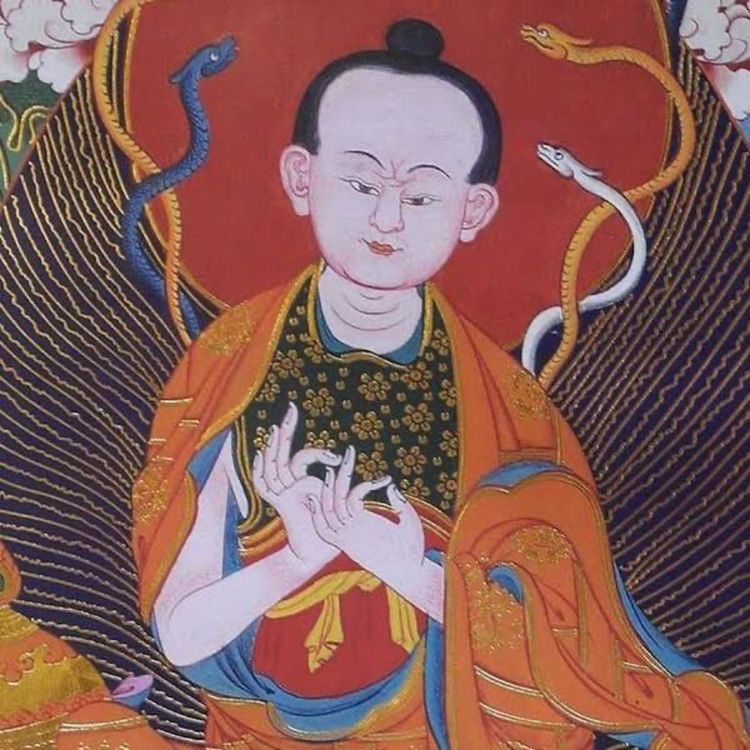
Let's Talk Religion
Are all things empty? - Nagarjuna & The Buddhist Middle Way
Ep. 70
•
We're finally doing Buddhism! In this episode, we explore the teachings of the Buddhist philosopher Nagarjuna and his school, known as Madhyamika, or "The Middle Way".
Sources/Suggested Reading:
- Siderits, Mark & Shoryu Katsura (Translated by) (2013). "Nagarjuna's Middle Way: The Mulamadhyamakakarika". Classics of Indian Buddhism. Wisdom Publications.
- Westerhoff, Jan (2009). "Nagarjuna's Madhyamaka: A Philosophical Introduction". Oxford University Press.
- Ziporyn, Brook (2016). "Emptiness and Omnipresence: An essential introduction to Tiantai Buddhism". Indiana University Press.
#Nagarjuna #Buddhism #Emptiness
More episodes
View all episodes
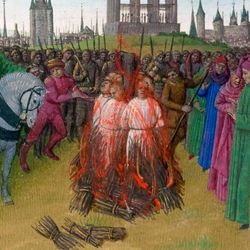
142. The Amalricians - Pantheist Christianity?
22:08||Ep. 142Dive into the forgotten history of the Amalricians, a radical medieval sect branded heretical by the Catholic Church. Followers of philosopher Amalric of Bena, the Amalricians believed in a mystical union with God and a controversial idea: that God was not separate from creation. Discover how their daring pantheistic beliefs challenged Church orthodoxy — and led to their dramatic suppression in the early 13th century.Find me and my music here:https://linktr.ee/filipholmSupport Let's Talk Religion on Patreon: https://www.patreon.com/letstalkreligion Or through a one-time donation: https://paypal.me/talkreligiondonateSources/Recomended Reading:Angus Braid's Website "The Amalrician Heresy" is an excellent source on the Amalricians in particular: https://theamalricianheresy.wordpress.comCohn, Norman (1970). "The Pursuit of the Millennium: Revolutionary Millenarians and Mystical Anarchists of the Middle Ages". Oxford University Press.McGinn, Bernard. "The Presence of God" Series, in several volumes. Perhaps the best and most comprehensive introduction to Christian mysticism. Published by Crossroad Publishing Co.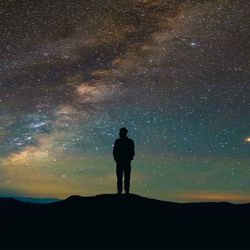
141. What is Pantheism?
38:11||Ep. 141In this episode, we explore the powerful philosophy of Pantheism—the belief that God is identical with the universe and everything in it. From ancient roots to modern interpretations, we dive deep into how Pantheism connects spirituality, science, and nature in a unified vision of reality.Find me and my music here:https://linktr.ee/filipholmSupport Let's Talk Religion on Patreon: https://www.patreon.com/letstalkreligion Or through a one-time donation: https://paypal.me/talkreligiondonateAlso check out the Let's Talk Religion Podcast: https://open.spotify.com/show/0ih4sqtWv0wRIhS6HFgerb?si=95b07d83d0254bSources/Recomended Reading:Chittick, William (1989). "The Sufi Path of Knowledge: Ibn 'Arabi's Metaphysics of Imagination".Chittick, William (1998). "The Self-Disclosure of God: Principles of Ibn al-'Arabi's Cosmology". State University of New York Press.Chittick, William (2005). "Ibn Arabi: Heir to the Prophets". OneWorld Publications.Garrett, Don (1996). "The Cambridge Companion to Spinoza". Cambridge University Press.Gatti, Hilary (ed.) (2002). "Giordano Bruno: Philosopher of the Renaissance". Routledge.Idel, Moshe (1990). "Kabbalah: New Perspectives". Yale University Press.Inwood, Brad (ed.) (2003). "The Cambridge Companion to the Stoics". Cambridge University Press.Levine, Michael P.P. (2014). "Pantheism: A Non-Theistic Concept of Deity". Routledge.McGinn, Bernard. "The Presence of God" Series, in several volumes. Perhaps the best and most comprehensive introduction to Christian mysticism. Published by Crossroad Publishing Co.Scholem, Gershom (1995). "Major Trends in Jewish Mysticism". Schocken Books; Revised edition.Rubenstein, Mary-Jane (2018). "Pantheologies: Gods, Worlds, Monsters". Columbia University Press.Wolfson, Harry Austryn (2014). "The Philosophy of Spinoza: Unfolding the Latent Processes of His Reasoning". Harvard University Press."The Ethics" by Spinoza"Cause, Principle & Unity" by Giordano Bruno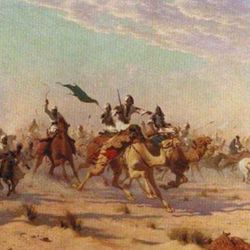
140. What is Jihad?
01:02:09||Ep. 140In this episode, we given an academic, historical overview of the concept of Jihad in Islam, dispelling some misconceptions and nuancing an otherwise thorny topic.Sources/Recomended Reading:Al-Dawoody, Ahmed Mohsen (2009). "War in Islamic Law: Justifications and Regulations". PhD Thesis. University of Birmingham.Bashir, Khaled Ramadan (2018). "Islamic International Law: Historical Foundations and Al-Shaybani's Siyar". Edward Elgar Publishing Limited.Bonner, Michael (2008). “Jihad in Islamic History: Doctrines and Practice”. Princeton University Press.Brown, Jonathan A.C. (2019). "Slavery and Islam". Oneworld.Ghazi, Mahmood Ahmad (translated by) (1998). "Kitab al-Siyar al-Saghir" by Muhammad al-Shaybani. Islamic Research Institute.Hallaq, Wael (2004). "The Origins and Evolution of Islamic Law". Cambridge University Press. Hallaq, Wael (2009). "Sharia: Theory, Practice, Transformations". Cambridge University Press. Judd, Steven C. (2009). "al-Awza'i and Sufyan al-Thawri: The Umayyad Madhhab". In Bearman, Peri; Rudolph Peters & Frank E. Vogel (ed.), "The Islamic School of Law: Evolution, Devolution & Progress". Brill.Judd, Steven C. (2019). "'Abd al-Rahman b. Amr al-Awza'i". In the "Makers of the Muslim World" Series. Oneworld.Khan Nyazee, Imran Ahsan (translated by) (2000). "The Distinguished Jurist's Primer: Bidayat Al-Mujtahid Wa Nihayat Al-Muqtasid." Vol. 1-2. Garnet Publishing.Kimball, Michelle R. (2018). "Shaykh Ahmadou Bamba: A Peacemaker for Our Time". The Other Press Sdn. Bhd.Kiser, John W (2015). "Commander of the Faithful: The Life and Times of Emir Abd El-Kader". Monkfish Book Publishing Company.Urban, Elizabeth (2020). "Conquered Populations in Early Islam: Non-Arabs, Slaves and the Sons of Slave Mothers". Edinburgh University Press.Zawati, Hilmi M. (2015). "Theory of War in Islamic and Public International Law". In "Is Jihad Just War? War, Peace and Human Rights under Islamic and Public International Law", (Lewiston, NY: Edwin Mellen Press, 2001) 9-47, reprinted in Niaz A. Shah, ed., Islam and the Law of Armed Conflict (Cheltenham, UK: Edward Elgar,2015) 249-287.Zemmali, Ameur (1990). "Imam al-Awza'i and his humanitarian ideas". In International Review of the Red Cross (1961 - 1997) , Volume 30 , Issue 275 , April 1990 , pp. 115 - 123. International Committee of the Red Cross.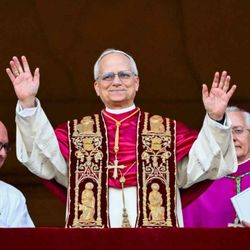
139. Who are the Augustinians?
20:38||Ep. 139Find me and my music here:https://linktr.ee/filipholmSupport Let's Talk Religion on Patreon: https://www.patreon.com/letstalkreligion Or through a one-time donation: https://paypal.me/talkreligiondonateSources/Recomended Reading:Gutierrez, David (1984). "The Augustinians in The Middle Ages 1256-1356". In "History of The Order of Saint Augustine. Volume 1 - Part 1.". Augustinian Historical Institute. Villanova University.McGinn, Bernard. "The Presence of God" Series, in several volumes.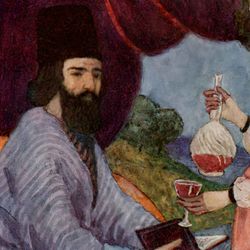
138. Was Alcohol Always Forbidden in Islam?
34:34||Ep. 138Find me and my music here:https://linktr.ee/filipholmSupport Let's Talk Religion on Patreon: https://www.patreon.com/letstalkreligion Or through a one-time donation: https://paypal.me/talkreligiondonateSources/Recomended Reading:Clarke, Abdussamad (translated by) (2021). "The Kitab al-Athar of Abu Hanifah". Turath Publishing.El Shamsy, Ahmed (2013). "The Canonization of Islamic Law: A Social and Intellectual History". Cambridge University Press.Gohlman, William E. (translated by) (1974). "The Life of Ibn Sina: A Critical Edition and Annotated Translation". State University of New York Press.Haider, Najam (2012). "The Origins of the Shi'a: Identity, Ritual and Sacred Space in Eighth Century Kufa". Cambridge University Press.Haider, Najam (2013). "Contesting Intoxication: Early Juristic Debates over the Lawfulness of Alcoholic Beverages". In Islamic Law and Society 20 (2013) 48-89. Brill. Hallaq, Wael (2004). "The Origins and Evolution of Islamic Law". Cambridge University Press. Hallaq, Wael (2009). "Sharia: Theory, Practice, Transformations". Cambridge University Press. Wyman-Landgraf, Umar F. Abd-Allah (2013). "Malik and Medina: Islamic Reasoning in the Formative Period". Brill.al-Tahawi's "al-Mukhtasar". Arabic version.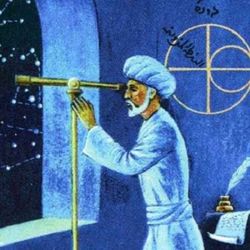
137. Nasir al-din al-Tusi: The Greatest Islamic Astronomer?
51:07||Ep. 137Find me and my music here:https://linktr.ee/filipholmSupport Let's Talk Religion on Patreon: https://www.patreon.com/letstalkreligion Or through a one-time donation: https://paypal.me/talkreligiondonateSources/Recomended Reading:Badakhchani, S.J. (translated by) (1999). “Contemplation and Action: The Spiritual Autobiography of a Muslim Scholar”. I.B. Tauris.Badakhchani, S.J. (translated by) (2004). “The Paradise of Submission: A Medieval Treatise on Ismaili Thought”. Ismaili Texts and Translations. I.B. Tauris.Chittick, William (1981). “Mysticism versus Philosophy in Earlier Islamic History: The Al-Ṭūsī, Al-Qūnawī Correspondence”. In Religious StudiesVol. 17, No. 1 (Mar., 1981). Cambridge University Press.Daftary, Farhad (2007). "The Isma'ilis: Their history and doctrines". Cambridge University Press.Meisami, Sayeh (2019). “Nasir al-Din Tusi: A Philosopher for All Seasons”. The Islamic Texts Society.Qara’i, Ali Quli (translated by) (?) “Awsaf al-Ashraf: Attributes of the Noble”. In al-Tawhid Islamic Journal, Vol.11, No.3, No.4.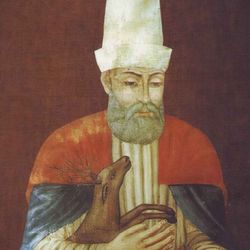
136. What is the Bektashi Order?
53:45||Ep. 136Find me and my music here:https://linktr.ee/filipholmSupport Let's Talk Religion on Patreon: https://www.patreon.com/letstalkreligion Or through a one-time donation: https://paypal.me/talkreligiondonateAlso check out the Let's Talk Religion Podcast: https://open.spotify.com/show/0ih4sqtWv0wRIhS6HFgerb?si=95b07d83d0254bSources/Recomended Reading:Elsie, Robert (2019). "The Albanian Bektashi: History and Culture of a Dervish Order in the Balkans". I.B. Tauris.Kingsley Birge, John (1937). "The Bektashi Order of Dervishes". Hartford Seminary Press.Smith, Grace Martin (1993). "The Poetry of Yunus Emre: A Turkish Sufi Poet". University of California Press.Soileau, Mark (2018). "Humanist Mystics: Nationalism and the Commemoration of Saints in Turkey". The University of Utah Press.
135. Is Islam a Western Religion?
25:53||Ep. 135Find me and my music here:https://linktr.ee/filipholmSupport Let's Talk Religion on Patreon: https://www.patreon.com/letstalkreligion Or through a one-time donation: https://paypal.me/talkreligiondonateSources/Recomended Reading:Ahmed, Shahab (2017). "What is Islam?: The Importance of Being Islamic". Princeton University Press.Bulliet, Richard (2004) "The Case for Islamo-Christian Civilization". Columbia University Press.Melvin-Koushki, Matthew (2017). "Powers of One: The Mathematicalization of the Occult Sciences in the High Persianate Tradition". Intellectual History of the Islamicate World 5, no. 1: 127-99.Ragep, F. Jamil (2004). "Copernicus and His Islamic Predecessors: An Aspect of Islamic Influence on Science". Osiris 16 n.s.: 49-71.SHWEP episodes:https://shwep.net/podcast/matthew-melvin-koushki-on-islam-the-west-and-western-esotericism/https://shwep.net/podcast/matthew-melvin-koushki-on-the-west/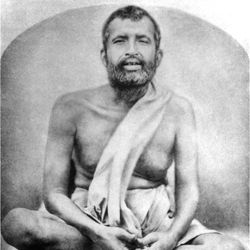
134. Sri Ramakrishna & Universal Vedanta
44:34||Ep. 134We explore one of the most influential and significant Hindu figures in modern times.Written by Anmol KohliCo-written by myself (Filip Holm)Find me and my music here:https://linktr.ee/filipholmSupport Let's Talk Religion on Patreon: https://www.patreon.com/letstalkreligion Or through a one-time donation: https://paypal.me/talkreligiondonateSources/Recomended Reading:Swami Saradananda, Sri Ramakrishna and His Divine Play (translated by Swami Chetanananda) - the "Leelaprasanga". Vedanta Society of St. Louis.Mahendranath Gupta, The Gospel of Sri Ramakrishna (translated by Swami Nikhilananda) - the "Kathamrita". Ramakrishna-Vivekananda Center,N.Y.Ayon Maharaj, Infinite Paths to Infinite Reality: Sri Ramakrishna and Cross-Cultural Philosophy of Religion. OUP USA.The Life of Swami Vivekananda, by his Eastern and Western Disciples. Vedanta Pr.